Research on New Energy Vehicle Power Battery Recycling Deposit System Based on Evolutionary Game Perspective
Abstract
1. Introduction
2. Literature Review
2.1. Research on Power Battery Recycling
2.2. Research on the Application of the Deposit System in the Field of Battery Recycling
2.3. Research on Evolutionary Game Theory
3. Deposit System Under Market Mechanisms
3.1. Parameter Setting and Payment Matrix
3.2. Two-Party Game Model and Solution
4. Deposit System with Government Participation
4.1. Description of Symbols and Payment Matrices
4.2. Solution and Stability Analysis of the Three-Party Game Model
4.2.1. Analysis of Evolutionarily Stable Strategies of Each Party in a Three-Party Game
4.2.2. Stability Analysis of Equilibrium Points of Tripartite Evolutionary Game Systems
5. Game Model Simulation Discussion
5.1. Stable Equilibrium Point Simulation
5.2. Sensitivity Analysis
5.2.1. The Impact of Subsidies for Complete Vehicle Enterprises on System Evolution
5.2.2. The Impact of Consumer Environmental Awareness on System Evolution
5.2.3. The Impact of Deposit Amount on System Evolution
6. Conclusions
Author Contributions
Funding
Institutional Review Board Statement
Informed Consent Statement
Data Availability Statement
Conflicts of Interest
References
- Zheng, X. 2024 Domestic New Energy Vehicle Sales Reach 12.866 Million Units. Auto Rev. 2025, 2, 106–107. [Google Scholar]
- Zan, X.; Zhang, D. Analysis on the optimal recycling path of Chinese lead-acid battery under the extended producer responsibility system. Sustainability 2022, 14, 4950. [Google Scholar] [CrossRef]
- Zhong, X.; Chen, L.; Han, J.; Liu, W.; Jiao, F.; Qin, W. Overview of present situation and technologies for the recovery of spent lithium-ion batteries. Chin. J. Eng. 2021, 43, 161–169. [Google Scholar]
- Gao, Y.-L.; Gong, B.; Liu, Z.; Tang, J.; Wang, C. The behavioural evolution of the smart electric vehicle battery reverse supply chain under government supervision. Ind. Manag. Data Syst. 2023, 123, 2577–2606. [Google Scholar] [CrossRef]
- Li, Z.; Zhong, X.; Xu, X. The mechanism of retired power batteries recycling through blockchain token incentives. J. Clean. Prod. 2023, 415, 137560. [Google Scholar] [CrossRef]
- Li, X.; Du, J.; Liu, P.; Wang, C.; Hu, X. Optimal choice of power battery joint recycling strategy for electric vehicle manufacturers under a deposit-refund system. Int. J. Prod. Res. 2022, 61, 7281–7301. [Google Scholar] [CrossRef]
- Ding, H. The Recycling Management Reference and Inspiration of US Power Battery. Environ. Prot. 2016, 44, 69–72. [Google Scholar]
- Wang, P.; Liu, B.; Gao, E.; He, D. Status quo and suggestions of recycling standard for vehicle power battery. Battery Bimon. 2020, 50, 280–283. [Google Scholar]
- Han, S.; Deng, Y.; Hou, G. International Management Experience of Waste Power Lithium Battery Recycling and Utilization, and Its Reference Significance. Environ. Prot. 2023, 51, 83–86. [Google Scholar]
- Li, X.; Mu, D.; Du, J. Game-based system dynamics simulation of deposit-refund scheme for electric vehicle battery recycling in China. Resour. Conserv. Recycl. 2020, 157, 104788. [Google Scholar] [CrossRef]
- Xie, J.; Le, W.; Guo, B. Pareto Equilibrium of New Energy Vehicle Power Battery Recycling Based on Extended Producer Responsibility. Chin. J. Manag. Sci. 2022, 30, 309–320. [Google Scholar]
- Zeng, X.; Li, J.; Liu, L. Solving spent lithium-ion battery problems in China, Opportunities and challenges. Renew. Sustain. Energy Rev. 2015, 52, 1759–1767. [Google Scholar] [CrossRef]
- Lu, C.; Zhao, M.; Tao, J. Pricing Strategy and Coordination Mechanism of Power Battery Recycling under the Dual Risks from Demand and Quality. Oper. Res. Manag. Sci. 2020, 29, 195–203. [Google Scholar]
- Xie, J.; Li, J.; Yang, F. Decision-making and coordination optimized for multi-stage closed-loop supply chain of new energy vehicle. J. Ind. Eng. Eng. Manag. 2020, 34, 180–193. [Google Scholar]
- Provisional Regulations on Traceability Management of Recycling and Utilization of Power Batteries for New Energy Vehicles. Available online: https://www.gov.cn/zhengce/zhengceku/2018-12/31/content_5439636.htm (accessed on 2 July 2018).
- Wei, L.; Wang, C. Regulatory Strategies of New Energy Vehicle Power Battery Recycling Based on SD Evolutionary Game. J. Syst. Sci. Math. Sci. 2023, 43, 1314–1330. [Google Scholar]
- Zhang, C.; Chen, Y. Decision and Coordination of Cascade Utilization Power Battery Closed-loop Supply Chain with Economies of Scale under Government Subsidies. Oper. Res. Manag. Sci. 2021, 30, 72–77+91. [Google Scholar]
- Dong, B.; Ge, J. What affects consumers’ intention to recycle retired EV batteries in China? J. Clean. Prod. 2022, 359, 132065. [Google Scholar] [CrossRef]
- Gao, Y.; Li, Z. Research on Extended Recovery Model of Power Battery Producer Responsibility Considering Informal Organization. Bus. Rev. 2024, 36, 225–236. [Google Scholar]
- Zhang, M.; Wu, W.; Song, Y. Study on the impact of government policies on power battery recycling under different recycling models. J. Clean. Prod. 2023, 413, 137492. [Google Scholar] [CrossRef]
- Wang, W.; Ding, J.; Lin, X. A study of the guiding role of government subsidy to price competition with dual-channel of collection. Sci. Res. Manag. 2020, 41, 227–237. [Google Scholar]
- Hu, W.; Zhou, J.; Ma, C. Mode selection for dual-channel retired power battery recycling closed-loop supply chain. Syst. Eng.-Theory Pract. 2024, 44, 2572–2595. [Google Scholar]
- Zhou, X.; Li, J.; Li, F.; Deng, X. Recycling supply chain mode of new energy vehicle power battery based on Blockchain technology. Comput. Integr. Manuf. Syst. 2023, 29, 1386–1398. [Google Scholar]
- Hao, S.; Dong, Q.; Li, J. Analysis and tendency on the recycling mode of used EV batteries based on cost accounting. China Environ. Sci. 2021, 41, 4745–4755. [Google Scholar]
- Jiao, J.; Pan, Z.; Li, J. Selection of Power Battery Recycling Model Considering Economic Benefits of Reuse and Emission Efficiency. Chin. J. Manag. Sci. 2024, 32, 201–213. [Google Scholar]
- Zhang, C.; Tian, Y.; Cui, M. Selection of Hybrid Channel Recycling Modes and Carbon Emission Reduction Decisions for the Electric Vehicle Battery Manufacturer. Chin. J. Manag. Sci. 2024, 32, 184–195. [Google Scholar]
- Liu, J.; Xue, J.; Zhang, S. Contract Coordination of Power Battery Collecting Channels Under the Government Carbon Tax and Recycling Subsidy. Sci. Technol. Manag. Res. 2022, 42, 160–168. [Google Scholar]
- Dong, Q.; Tan, Q.; Hao, S. Recycling Modes and Economic Analysis of New Energy Vehicle Power Batteries in Beijing. Sci. Technol. Manag. Res. 2020, 40, 219–225. [Google Scholar]
- Tang, Y.; Zhang, Q.; Li, Y.; Wang, G.; Li, Y. Recycling mechanisms and policy suggestions for spent electric vehicles’ power battery—A case of Beijing. J. Clean. Prod. 2018, 186, 388–406. [Google Scholar] [CrossRef]
- Wang, Y.; Dong, B.; Ge, J. How can the recycling of power batteries for EVs be promoted in China? A multiparty cooperative game analysis. Waste Manag. 2024, 186, 64–76. [Google Scholar] [CrossRef]
- Yi, H.; Liu, J. Dynamic pricing in power battery closed-loop supply chain with carbon trading policy. Comput. Integr. Manuf. Syst. 2024, 30, 2228–2240. [Google Scholar]
- Feng, Z.; Chao, Q.; Tan, C. The strategy choice between competition and co-opetition for electric vehicle manufacturers with battery recycling. Syst. Eng.-Theory Pract. 2024, 44, 625–653. [Google Scholar]
- Kulshreshtha, P.; Sarangi, S. “No return, no refund”, an analysis of deposit-refund systems. J. Econ. Behav. Organ. 2001, 46, 382–394. [Google Scholar] [CrossRef]
- Huang, Y.; Liu, Y.; Zheng, B. Recycling Decision of Closed-loop Supply Chain Considering Competition—Based on Government-driven and Market-driven Deposit Refund System. Oper. Res. Manag. Sci. 2024, 33, 51–56. [Google Scholar]
- Zhou, G.; Gu, Y. A systematic review of the deposit-refund system for beverage packaging, Operating mode, key parameter and development trend. J. Clean. Prod. 2020, 251, 119660. [Google Scholar] [CrossRef]
- Wang, W.; Wang, Z.; Yang, S. Deposit-refund System of a Closed-loop Supply Chain under Competition between Manufacturers. Chin. J. Manag. Sci. 2021, 29, 179–188. [Google Scholar]
- Linderhof, V.; Oosterhuis, F.H.; Van Beukering, P.J.; Bartelings, H. Effectiveness of deposit-refund systems for household waste in The Netherlands: Applying a partial equilibrium model. J. Environ. Manag. 2019, 232, 842–850. [Google Scholar] [CrossRef]
- Georgakellos, D.A. The use of the deposit-refund framework in port reception facilities charging systems. Mar. Pollut. Bull. 2007, 54, 508–520. [Google Scholar] [CrossRef]
- Zhao, S.; Xu, N.; Qiao, Y.; Yang, B. Suggestions on Speeding up Recycling of Power Battery for New Energy Vehicles in China. Strateg. Study CAE 2018, 20, 144–148. [Google Scholar] [CrossRef]
- Wu, W.; Zhang, M.; Jin, D.; Ma, P.; Wu, W.; Zhang, X. Decision-making analysis of electric vehicle battery recycling under different recycling models and deposit-refund scheme. Comput. Ind. Eng. 2024, 191, 110109. [Google Scholar] [CrossRef]
- Weibull, J.W. Evolutionary Game Theory, 1st ed.; MIT Press: Cambridge, MA, USA, 1995. [Google Scholar]
- Sandholm, W.H. Population Games and Evolutionary Dynamics, 1st ed.; MIT Press: Cambridge, MA, USA, 2010. [Google Scholar]
- Xu, Y.; Fu, L.; Lv, X.; Sun, D. Research on Cooperation Business Model Selection Mechanism between New Energy Vehicle Manufacturers and Ladder Utilization Enterprises: Based on the Perspective of Retired Battery Ladder Utilization. Oper. Res. Manag. Sci. 2023, 32, 151–157. [Google Scholar]
- Li, Y.; Zhang, J. Evolutionary Game Analysis of Low-Carbon Incentive Behaviour of Power Battery Recycling Based on Prospect Theory. Sustainability 2024, 16, 2793. [Google Scholar] [CrossRef]
- Li, G.; Lu, M.; Lai, S.; Li, Y. Research on Power Battery Recycling in the Green Closed-Loop Supply Chain: An Evolutionary Game-Theoretic Analysis. Sustainability 2023, 15, 10425. [Google Scholar] [CrossRef]
- Cao, X.; Xing, Z.; Zhang, L. An Evolutionary Game Analysis of New Energy Vehicle Industry Development under Government Regulations. Bus. Rev. 2018, 30, 82–96. [Google Scholar]
- Gao, Y.; Liu, Y.; Tan, Z.; Li, Z. Analysis of cooperation equilibrium of participants in power battery recycling chains considering information barrier. Chin. J. Popul. Resour. Environ. 2022, 20, 159–167. [Google Scholar] [CrossRef]
- Sigman, H. A Comparison of Public Policies for Lead Recycling. RAND J. Econ. 1995, 26, 452–478. [Google Scholar] [CrossRef]
- Taylor, P.D.; Jonker, L.B. Evolutionary stable strategies and game dynamics. Math. Biosci. 1978, 40, 145–156. [Google Scholar] [CrossRef]
- Friedman, D. Evolutionary games in economics. Econometrica 1991, 59, 637–666. [Google Scholar] [CrossRef]
- Lyapunov, A.M. The general problem of the stability of motion. Int. J. Control 1992, 55, 531–534. [Google Scholar] [CrossRef]
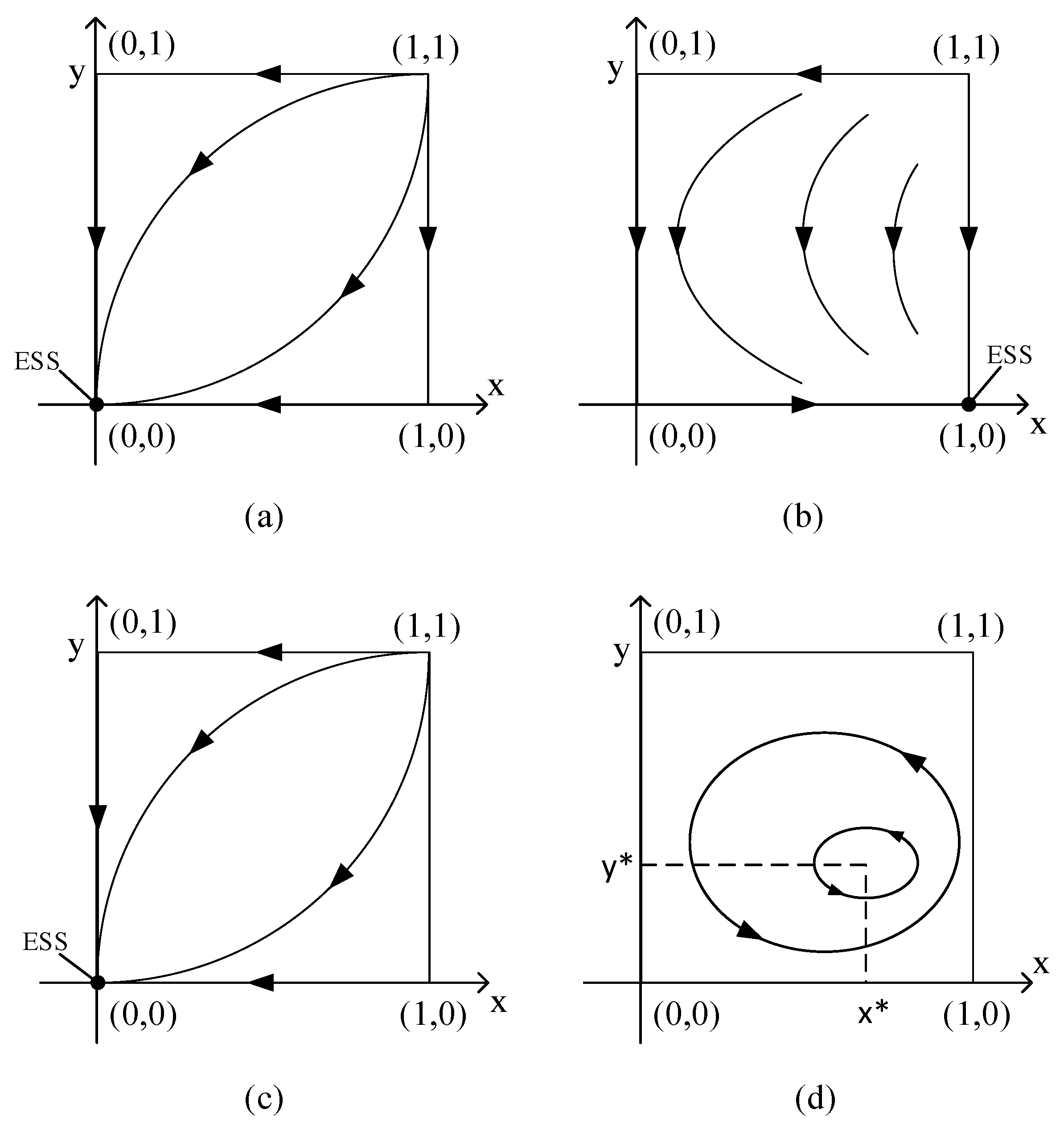
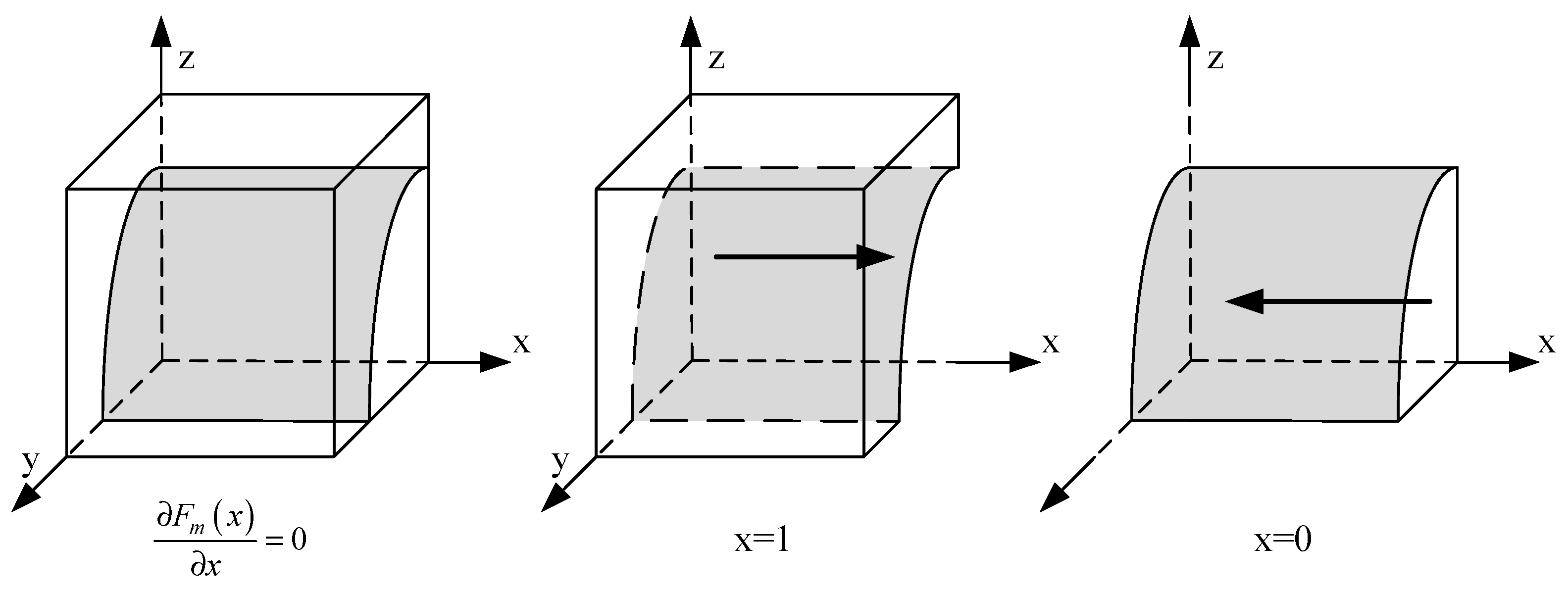
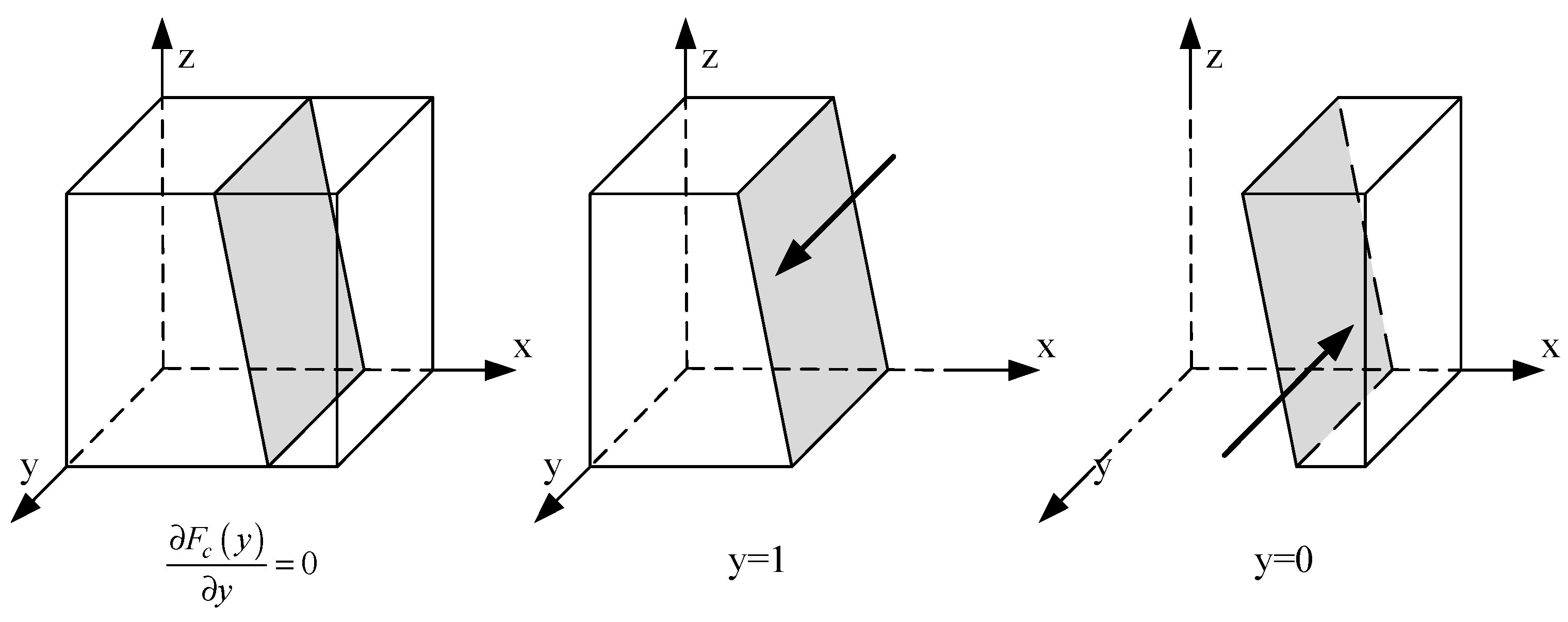
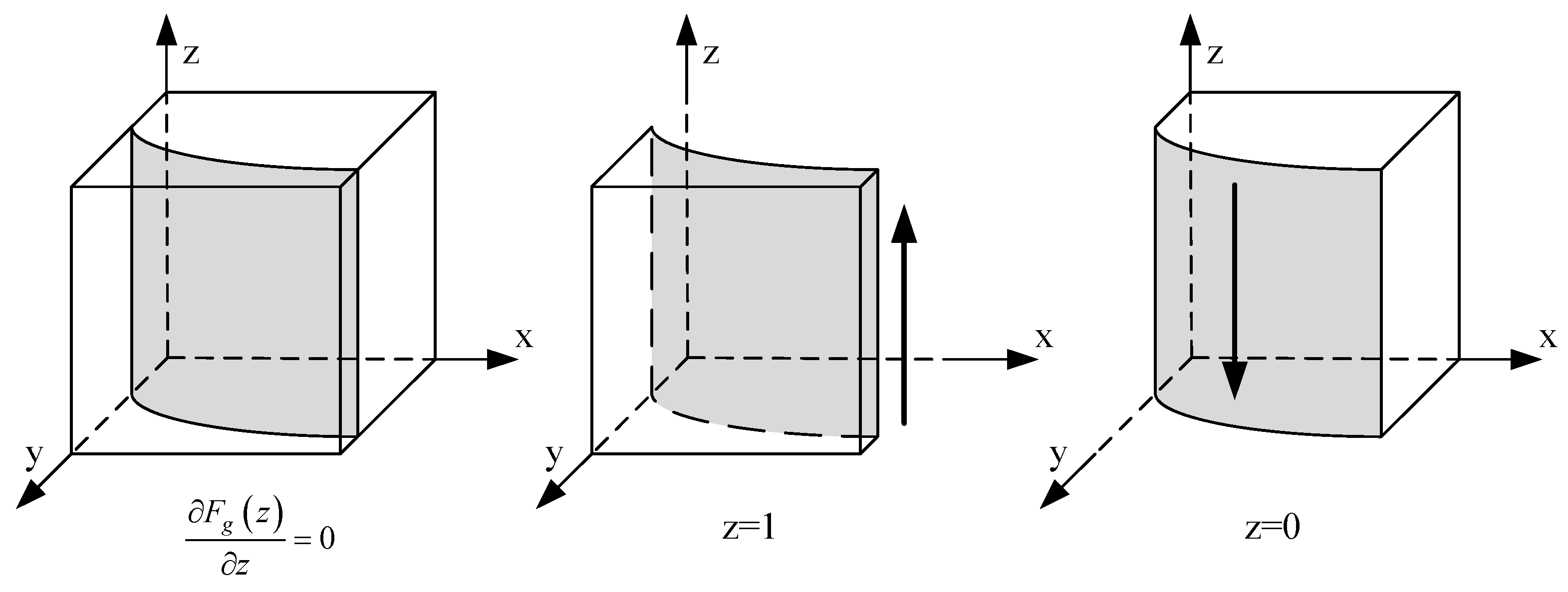
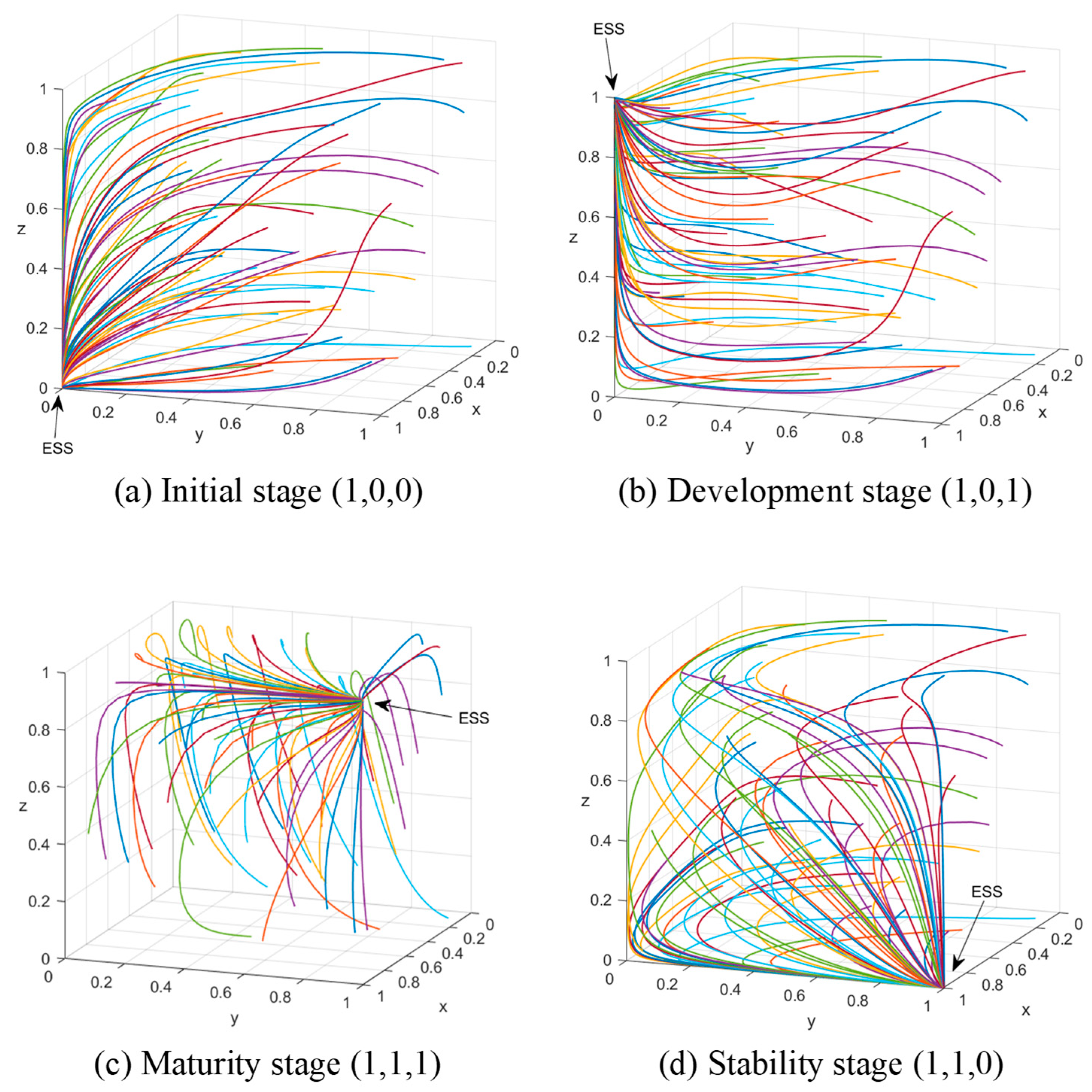




| Author(s) | Recycling Mode | Power Battery Recycling | Government Participation | Informal Recycling | Deposit System | Consumer Behavior |
|---|---|---|---|---|---|---|
| Li X. et al. (2022) [6] | VM, BM, TP | √ | √ | √ | ||
| Wei et al. (2023) [16] | VM | √ | √ | √ | √ | |
| Zhang et al. (2021) [17] | VM, BM, TP | √ | √ | |||
| Dong et al. (2022) [18] | --- | √ | √ | |||
| Gao et al. (2024) [19] | VM, BM | √ | √ | |||
| Jiao et al. (2024) [25] | VM, BM, TP | √ | √ | |||
| Huang et al. (2024) [34] | VM, BM, TP | √ | √ | |||
| Wang et al. (2021) [36] | VM, BM | √ | √ | √ | ||
| Linderhof et al. (2019) [37] | BM | √ | √ | |||
| Cao et al. (2018) [46] | --- | √ | √ | |||
| This paper | VM | √ | √ | √ | √ | √ |
| Consumers | |||
|---|---|---|---|
| Vehicle manufacturer | Implementation | ||
| Non-implementation | |||
| Equilibrium Point | ||
|---|---|---|
| 0 |
| Strategist | Symbol | Meaning |
|---|---|---|
| Vehicle manufacturer | Benefits to businesses when consumers participate in formal recycling | |
| Potential benefits to the enterprise | ||
| Subsidies given by companies to consumers | ||
| Consumer | Battery gains from formal consumer recycling | |
| Battery gains from informal consumer recycling | ||
| Consumer’s environmental awareness | ||
| Government | Benefits of the government achieving carbon reduction targets | |
| Deposit | ||
| Penalties for informal recycling enterprises | ||
| Supervision costs, operating costs of the deposit system | ||
| Environmental treatment costs |
| Government | |||||
|---|---|---|---|---|---|
| Regulate | Do Not Regulate | ||||
| Vehicle manufacturer | |||||
| Positive or Negative | Result | ||||
|---|---|---|---|---|---|
| Unstable | |||||
| ESS of Condition 1 | |||||
| Unstable | |||||
| Unstable | |||||
| ESS of Condition 2 | |||||
| ESS of Condition 3 | |||||
| Unstable | |||||
| ESS of Condition 4 |
| Symbol | Value | Symbol | Value Range |
|---|---|---|---|
| 3 | [0, 1] | ||
| 1 | [0, 1] | ||
| 3 | [0, 3] | ||
| 5 | [0.2, 1.2] | ||
| 1 | [2, 4] |
Disclaimer/Publisher’s Note: The statements, opinions and data contained in all publications are solely those of the individual author(s) and contributor(s) and not of MDPI and/or the editor(s). MDPI and/or the editor(s) disclaim responsibility for any injury to people or property resulting from any ideas, methods, instructions or products referred to in the content. |
© 2025 by the authors. Licensee MDPI, Basel, Switzerland. This article is an open access article distributed under the terms and conditions of the Creative Commons Attribution (CC BY) license (https://creativecommons.org/licenses/by/4.0/).
Share and Cite
Cui, M.; Wang, Y. Research on New Energy Vehicle Power Battery Recycling Deposit System Based on Evolutionary Game Perspective. Sustainability 2025, 17, 3928. https://doi.org/10.3390/su17093928
Cui M, Wang Y. Research on New Energy Vehicle Power Battery Recycling Deposit System Based on Evolutionary Game Perspective. Sustainability. 2025; 17(9):3928. https://doi.org/10.3390/su17093928
Chicago/Turabian StyleCui, Mengyang, and Yuhong Wang. 2025. "Research on New Energy Vehicle Power Battery Recycling Deposit System Based on Evolutionary Game Perspective" Sustainability 17, no. 9: 3928. https://doi.org/10.3390/su17093928
APA StyleCui, M., & Wang, Y. (2025). Research on New Energy Vehicle Power Battery Recycling Deposit System Based on Evolutionary Game Perspective. Sustainability, 17(9), 3928. https://doi.org/10.3390/su17093928





